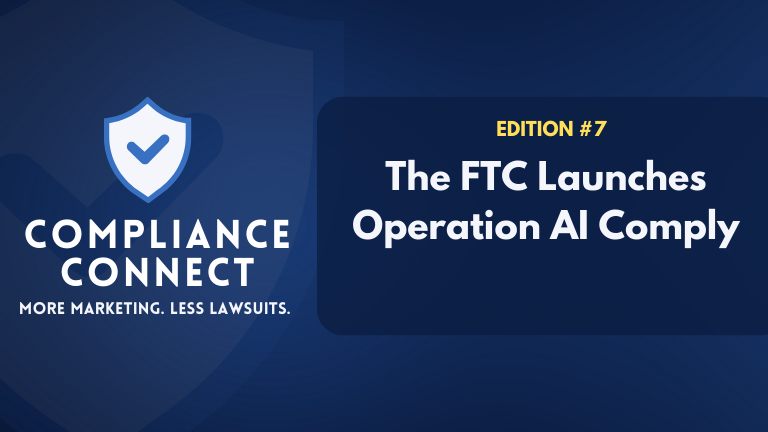Good morning! This is the seventh edition of the Compliant Connect newsletter.
The goal is simple: to keep you in the loop on what the FTC and other regulatory agencies are up to so that you can protect yourself.
These newsletters will land in your inbox twice a week – Mondays and Thursdays.
Remember: this is NOT legal advice, only information!
Here’s the rundown today…
- 🤖 The FTC Raises Cracks Down On AI Claims…
- 🏢 Corporate Landowner Hit With Settlement…
- 🆓 Complily Launches FREEmium Version…
- 📞 What Counts As Consent To Contact…
- ❓ Can You Use Screenshots Of Reviews In Your Marketing…
- 🦍 How To Avoid The 3,000 Pound Gorilla…
Compliance Digest: What You Should Read Today
FTC Announces Crackdown On Deceptive AI Claims, Schemes
The FTC has accused multiple companies of using AI to engage in deceptive practices.
The complaint calls out practices ranging from claiming to offer AI lawyer services, using AI-powered tools to generate online income, creating fake reviews, and falsely promised guaranteed income from online storefronts using AI.
These enforcement actions are part of the FTC’s Operation AI Comply to combat AI-related fraud. We can expect more to come.
The FTC Settles With Corporate Rental Giant For $48 Million
Invitation Homes agreed to pay $48 million to settle Federal Trade Commission. The FTC alleged that the defendant charged hidden fees, failed to maintain properties, and mishandling deposits.
The thrust of the complaint is that the FTC believes that Invitation Homes misled its tenants in its marketing, such as by promising that homes were inspected before they were rented out and offering 24/7 maintenance.
Invitation Homes settled without admitting wrongdoing.

Ask Greg Mailbag #3
FTC attorney Greg Christiansen from Guardian Law periodically answers questions from members of our community.
Reader: If a client books a scheduled call through an app like Calendly, does this equate to permission to contact? Or does there still need to be an express written consent?
No. Under the Telephone Consumer Protection Act (“TCPA”) you need express written consent to contact a client via telephone and text.
It is a misunderstanding that a client scheduling in Calendly gives you that express consent. Most of my clients will have “opt-in” language when a client schedules via Calendly that obtains that consent.
It’s simple to include, and it gives you an absolute right to contact the client, until or if the client withdraws his/her consent.
Andrew: Let’s say there are reviews for my product on an independent website that have a star rating. Am I allowed to screenshot the average star rating and use it on my sales page?
No. Grabbing a review or testimonial and reposting the review or testimonial without consent is not allowed, as a violation of the Testimonial and Endorsement Guidelines.
Now if you were to find a review site and you linked to that review site’s review page, you could do that.
For example, if you have a 5 star rating and an A+ with the BBB, you could refer to that and give the client a link where they could see the rating for themselves on the BBB website. That would be ok.
Nick: Just watched Episode 34 and am about to notify all my Customers about the need for DMCA and the popup re tracking disclosure.
It is actually the Privacy Policy or Privacy Statement. You need to make sure that you properly disclose how your company is using or utilizing client pixel and meta data when they visit your website.
I am encouraging clients to include cookie pop ups on their websites obtaining client’s permission to collect pixel and meta data when they visit the site.
If YOU have any questions about the FTC, rules and regulations, compliance best practices, and more, please send your questions to support@naoac.com with the subject line Newsletter – Question For Greg
Did You Know…
If you offer a done for you business opportunity, then there’s a good chance that you fall under the FTC’s Business Opportunity Rule.

3 Common State Laws You Need To Be Aware Of
Greg likes to say that dealing with the federal government is like picking a fight with a 5,000-pound gorilla, while dealing with a state is like dealing with a 3,000-pound gorilla.
You don’t want to fight either of them!
Fighting against a state is no laughing matter. It takes time and money. It can wear on you psychologically. It will be a MASSIVE distraction for your business.
Sometimes states team up with the FTC, such as in the Tax Club case where New York and Florida joined the FTC’s case.
The bottom line: you need to be aware of state laws in the areas that you do business. That includes where you operate out of AND where your customers live.
The federal government sets the minimum laws and regulations. States cannot go BELOW the federal regulations, but they’re free to be more extreme.
There are 3 common state regulatory laws…
- A deceptive practices act (Ex. Michigan)
- A telemarketing solicitations act (Ex. Montana)
- A business opportunity or seller assisted marketing plan act (Ex. Utah)
There are other state laws that you need to pay attention to, but these 3 categories are a good place to start.
Understanding state law is as important as understanding federal law.
Remember: make sure you’re compliant with the laws in every state in which you operate, regardless of where you’re based.
